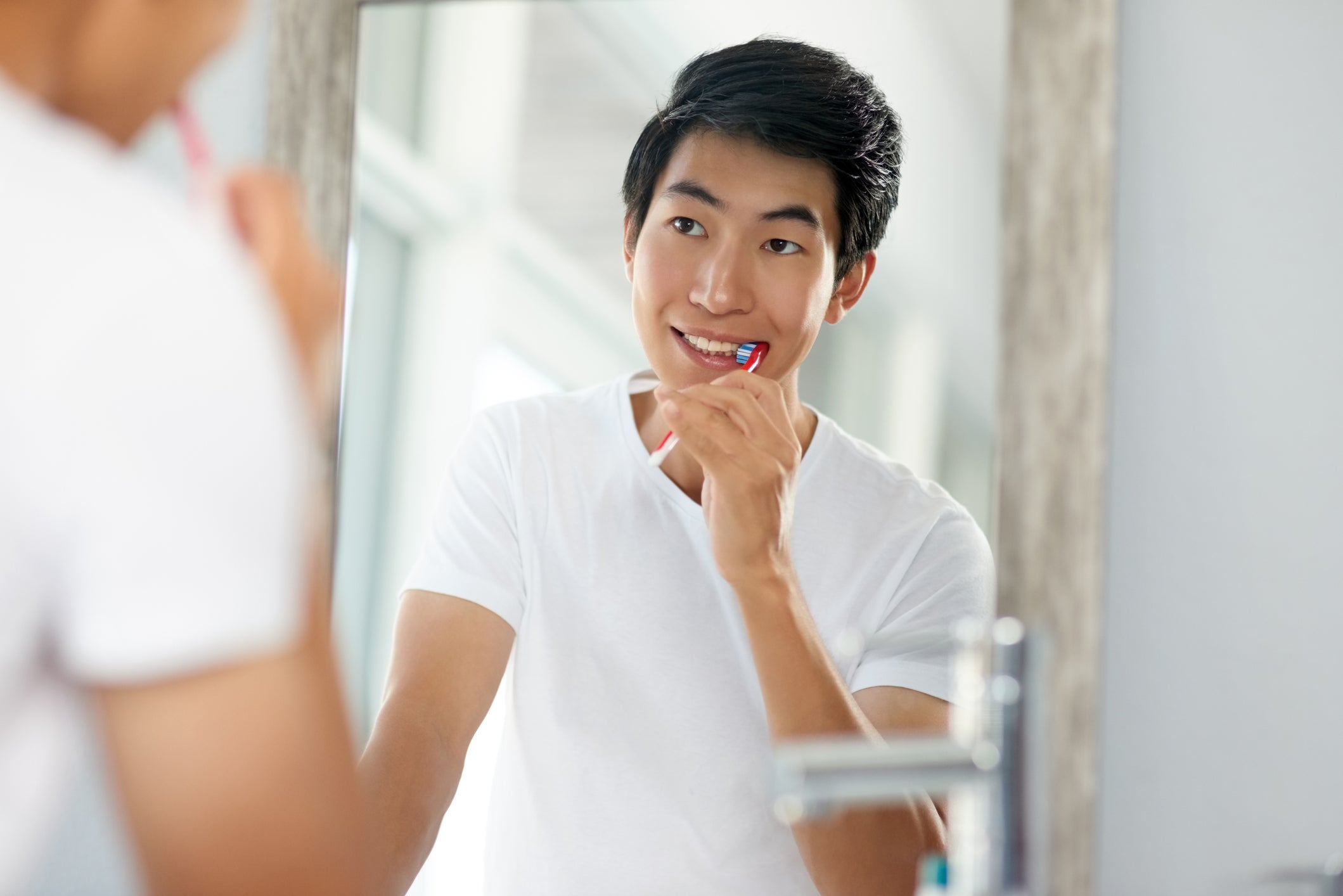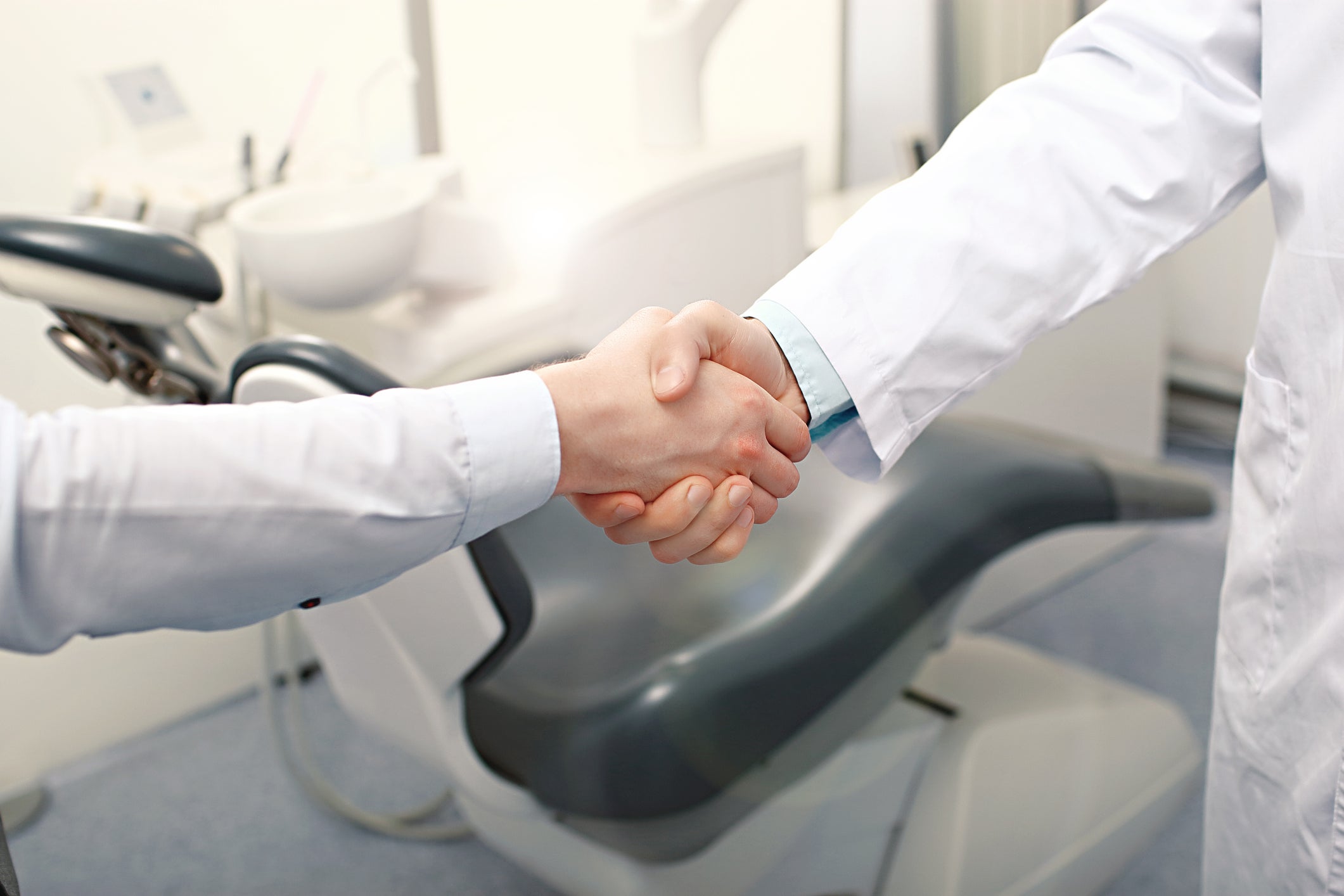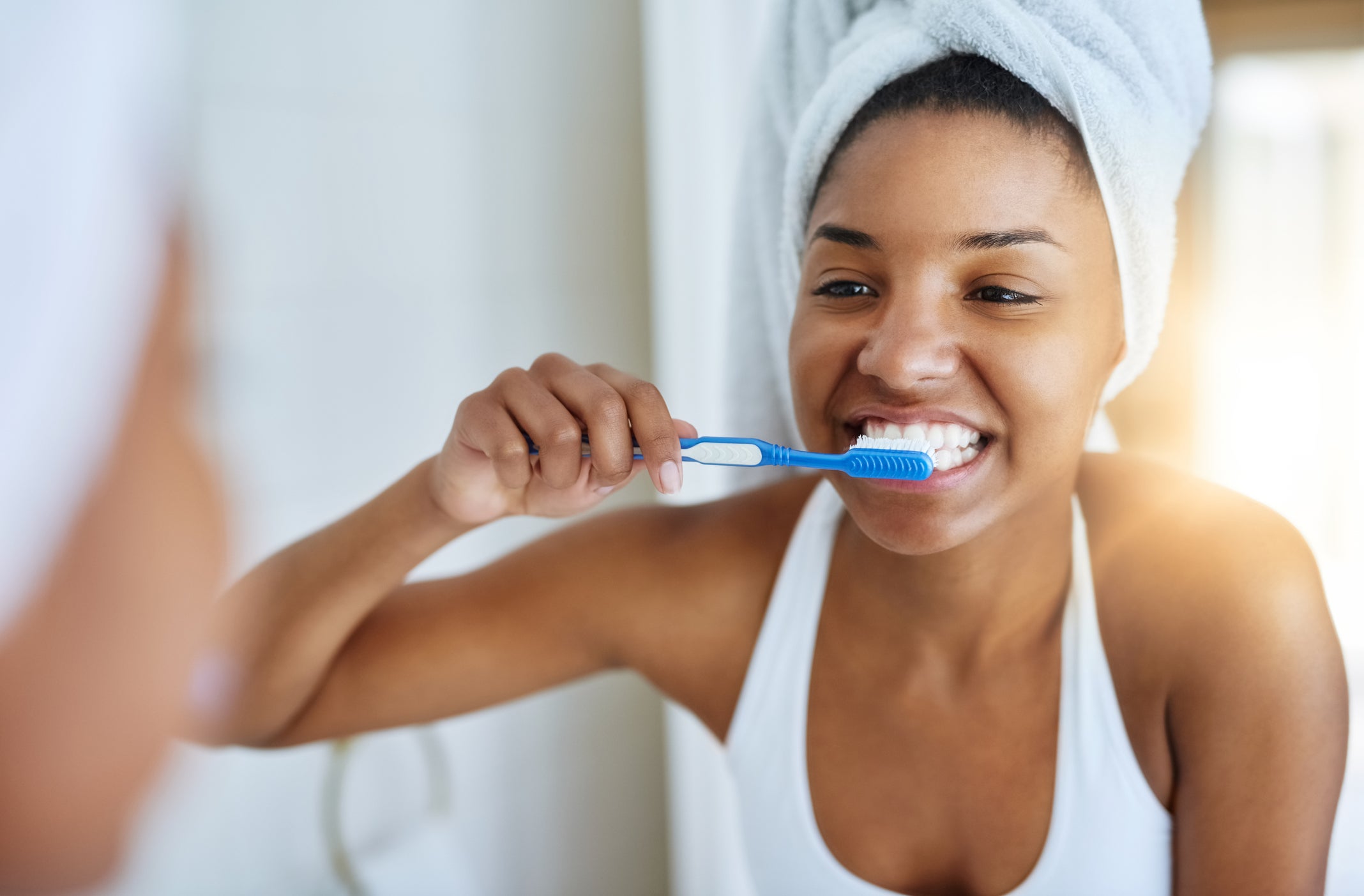-
Do Whitening Toothpastes Actually Work?

Could your teeth stand to be whiter? Most people would answer yes, which is why there are so many whitening toothpastes on the market. But do these toothpastes actually work? Read on to learn more about whitening toothpastes and additional treatments you might want to consider.
What do whitening toothpastes actually do? They work, using special abrasives and peroxide or other chemicals, to polish the teeth and dissolve stains. If you’ve got noticeable stains from things like coffee, cigarettes, or soda, whitening toothpaste will remove these stains and make a difference in the look of your teeth. Some whitening toothpastes use a chemical called blue covarine, which creates an optical illusion by adhering to the surface of the teeth and making them appear less yellow. It’s important to note, though, that whitening toothpastes can’t lighten stains under the surface of a tooth or change the tooth’s natural color.
Another fact to keep in mind is that the results of whitening toothpaste aren’t immediate. You’ll need to use your whitening toothpaste twice a day for two to six weeks in order to have teeth that look whiter. If you decide to go this route, make sure you’re using a brand of toothpaste that has the American Dental Association Seal of Acceptance or a similar endorsement from a reputable organization. Remember, though, that whitening toothpastes use abrasives, which can wear down the enamel as they’re removing stains.
Whitening toothpastes are not the only at-home options for tooth whitening. An over-the-counter tooth bleaching product or kit is a more effective option for lightening your teeth than toothpaste. These bleaches must stay in contact with the teeth for a longer time than toothpaste, and you’ll have to use this type of product regularly for two to four weeks.
Professional whitening is a much more effective alternative to anything you can do at home. One great option is Zoom!®, a whitening treatment that takes only an hour and whitens your teeth significantly. In fact, most people achieve about eight shades of whitening in the Zoom! process. After examining your teeth and gums to make sure they’re healthy, the dentist will cover your lops and gums with material to protect them while your teeth are being treated. The whitening gel is applied and activated by the Zoom! light source to gently break up stains and whiten your teeth. You’ll receive three 15-minute applications within the one hour treatment time, then you’ll rinse, and your treatment will be complete. It’s easy and painless, and the results are immediate.
If you’re looking for Zoom!® teeth whitening, we provide that and much more at the practice that was voted best dentist in NYC. At Park 56 Dental Group, we offer pediatric, prosthodontics, endodontics, oral surgery, Invisalign®, emergency, and sedation dentistry, all at the highest level of treatment. We serve the Midtown, Central Park, Upper East Side, Park Avenue, and all surrounding Manhattan and New York areas, with a patient-centered practice that has hours to fit your schedule. Schedule your complimentary consultation today by contacting us online or calling us at (212) 826-2322.
-
Signs it’s Time to Switch to a New Dentist

Change can be difficult, but sometimes it’s necessary. Is it time for you to change dentists? It can be a hard decision to make, especially if you’ve been with your dentist for a long time. Still, there are some clear signs that it’s time to move on.
- Maybe your needs have outgrown your dentist. If you’ve been going to a pediatric dentist and you’re now an adult, it’s definitely time for you to move along. If you have children, it’s smart to choose a dentist who offers both pediatric and adult dentistry.
- It could be that someone has moved. Maybe it’s you, or maybe it’s your dentist. Whether your favorite dentist has moved away from the practice, or you’ve relocated to a new town, a change in location can warrant a change of dentist. It’s important that the dentist you trust is in a location that’s convenient for you.
- Sometimes, your dentist won’t take your insurance. They may have changed their policies, or your may have switched providers. If your dental office is no longer in-network for your insurance plan, it’s time to switch.
- You might have noticed some red flags. If your dentist pressures you to use their practice for services for which you should consult a specialist, if the environment has changed to something that doesn’t feel hygienic or safe, or if you feel uncomfortable with the dentist or staff, move on. If you’re constantly having to dispute billing or the dentist discourages you from seeking a second opinion, those are also reasons to switch.
- If you’re not happy, that’s reason enough. If the dental practice you’re using is no longer meeting your needs, you have the right to find one that will. Whether it’s a lack of services provided, poor customer service, or another reason, look for a dentist where you’ll be happy.
Once you’ve decided to switch, what’s the next step? Do some research and find a practice that will be the right fit for you and your family. Look at the services offered, check out reviews, and research the dentist’s background and certifications. Beyond that, read up on the practice to determine their values, philosophy, and level of technology. Once you’ve done this, visit the office to see if it lives up to your expectations and meets your needs.
At Park 56 Dental Group, we are committed to meeting each patient’s specific needs. We’ve been providing top-quality care and treating each patient individually since 1997, making it comfortable and easy to visit the dentist. We accept many different insurance plans and welcome you to visit us so that you can make an educated decision about your dental care.
If you’re looking for the perfect dentist, choose the practice that was voted best dentist in NYC! At Park 56 Dental Group, we offer pediatric, prosthodontics, endodontics, oral surgery, Invisalign®, emergency, and sedation dentistry, all at the highest level of treatment. We serve the Midtown, Central Park, Upper East Side, Park Avenue, and all surrounding Manhattan and New York areas, with a patient-centered practice that has hours to fit your schedule. Schedule your complimentary consultation today by contacting us online or calling us at (212) 826-2322.
-
10 Ways Stress Can Impact Your Teeth

You know that stress can manifest as a headache, muscle tension, or high blood pressure, but have you ever considered how stress can impact your teeth? Here are 10 of the most commonly reported dental health issues linked to stress.
- Tooth grinding: Also known as bruxism, nighttime tooth grinding is a common condition, especially among stressed individuals. The unconscious habit wears down your teeth over time and may also cause tooth shifting and jaw pain.
- Tooth fractures: Teeth have tiny fissures in them due to everyday wear and tear. As long as they don’t become any worse, these fissures are no problem. Unfortunately, jaw clenching and stress go hand-in-hand, causing weak teeth to eventually fracture and break.
- Sensitivity: Nighttime grinding and daytime clenching can wear down the protective enamel layer, leaving your teeth more sensitive to hot and cold temperatures and sweet and sour foods.
- Temporomandibular joint (TMJ) pain: The TMJ is the joint connecting each side of your jaw to your skull. Pain or dysfunction in this joint is known as temporomandibular joint disorder, or TMD. Stress-related tooth grinding, jaw clenching, and muscle tension may cause or aggravate TMD.
- Gum disease: Some studies suggest a link between the stress hormone cortisol and bacterial growth that leads to gum disease, also called periodontal disease. This chronic oral health problem can cause gum sensitivity, bad breath, and eventually tooth loss.
- Cold sores: Also called fever blisters, cold sores are caused by the herpes simplex virus. Being upset or stressed can trigger an outbreak at the corners of your mouth, which may take a week or more to clear up.
- Canker sores: These painful mouth sores make it difficult to eat spicy, salty, or acidic foods. Experts aren’t sure what causes canker sores, also called recurrent aphthous stomatitis (RAS), but it appears that stress increases your risk.
- Oral infections: Stress negatively impacts your immune system, making you more vulnerable to low-grade infections in your mouth and elsewhere in your body.
- Dry mouth: Formally known as xerostomia, dry mouth is when your salivary glands fail to produce enough saliva. Among other causes, stress and anxiety have been shown to decrease saliva production, causing dry mouth.
- Bad oral health habits: Stressed-out people are often exhausted or pressed for time, making them more likely to neglect their oral health, as well as rely on cigarettes, alcohol, and unhealthy comfort food. All of these habits increase the risk of cavities, gum disease, and other concerns.
Don’t allow stress to wreak havoc on your dental health! Instead, take steps in your daily life to reduce anxiety, such as meditating, doing yoga, and working on your time management skills. Then, fit dentist visits into your busy schedule to keep on top of oral health problems as they arise. To work with the best dentist in New York, contact Park 56 Dental at (212) 826-2322. We have served patients in the 10022 zip code area for over 20 years.
-
What to Expect During Your First Visit to Park 56 Dental

At Park 56 Dental, we are committed to providing our patients with safe, gentle, high-quality dental care. We understand that you or your child may feel apprehensive about your first visit to our office. That’s why we’ll do everything we can to not only make you feel comfortable but truly pampered during your time with us. Here’s what to expect when you visit Park 56 Dental in NYC for the first time.
Review Your Dental & Medical History
Our first goal during your dental consultation is to understand your health. We will review any records you have from previous dentists, along with the patient information form we ask you to complete. Be sure to provide as much information as possible to accurately convey your health status.
Also, don’t forget to bring your insurance card so you can take advantage of your dental benefits when paying for services. This is also a good time to discuss any dental anxiety you have. Sedation dentistry could be a good option for you, depending on your needs.
Take Digital X-Rays
The next step is to have a closer look at your teeth and gums by taking X-rays. The digital imaging technology we use decreases radiation exposure by 90%, ensuring your safety while also making images available for immediate review. Your X-rays serve as a baseline for your current dental health and help us recommend immediate and long-term treatment options.
Clean and Polish Your Teeth
With digital imaging complete, it’s time to clean your teeth. Here’s what this entails:
- Physical exam: A dental hygienist checks your teeth and gums for signs of gingivitis. If major problems are detected, the hygienist might call in the dentist to make sure it’s okay to proceed with the cleaning.
- Plaque and tartar removal: Using a small mirror to check all surfaces, your hygienist removes plaque and tartar buildup from your teeth. This may involve scraping and spraying your teeth with a high-pressure water jet.
- Polishing: The hygienist polishes and removes stains from your teeth using a gritty paste.
- Flossing and rinsing: The hygienist touches up your smile by flossing and rinsing with water.
- Fluoride treatment: An optional fluoride gel at the end of your cleaning helps protect your teeth against cavities until your next dentist appointment.
Meet with the Dentist
Following a comprehensive teeth cleaning, your dentist will sit down with you to review the findings and discuss any immediate treatment needs. This is your chance to ask questions and discuss any cosmetic dentistry services you’re interested in, including veneers, tooth reshaping, whitening, and more.
Everyone’s busy, but regular dental checkups are an important part of maintaining a healthy smile! In fact, the American Dental Association recommends visiting the dentist every six months. If it’s been longer than this since your last visit, contact Park 56 Dental at (212) 826-2322 to schedule your first appointment with NYC’s best dentist. We have over 20 years of experience serving patients in the 10022 zip code area.
-
How to Reverse Cavities

No one wants to hear their dentist say, “You have a cavity.” The key to good oral health and a cavity-free mouth is to understand why cavities form so you can take steps to prevent and reverse them.
What Causes Cavities?
Cavities are the result of untreated tooth decay, which occurs when your teeth are repeatedly exposed to acid and bacteria. Your diet and oral care routine play a significant role in the formation of cavities. When you eat sugary or starchy foods, a sticky substance called plaque forms on your teeth. The bacteria in your mouth feed on this plaque, producing acid as a waste product. This acid then eats away at your teeth.
Tooth decay occurs in five stages:
- Demineralization: Your teeth lose and regain minerals all day long. The problem occurs when depleted minerals are not restored.
- Enamel decay: The outer layer of your teeth decays first.
- Dentin decay: As the problem spreads to the dentin layer, you may start to feel pain.
- Pulp decay: Pain and inflammation can become severe if decay reaches the inner pulp of your teeth.
- Abscesses: When bacteria inside a cavity spread beneath the pulp, a pocket of pus can form, causing a painful abscess.
Signs of Cavities
Watch out for these signs that your teeth are starting to decay:
- White spots on your teeth (a sign of mineral loss)
- Grey, black, or brown spots on your teeth (a sign of decay)
- Toothaches
- Painful chewing
- Sensitivity to hot, cold, or sweet substances
- Pits or holes in your teeth (detectable through an X-ray)
How to Prevent and Reverse Cavities
By the time a cavity is noticeable, it may be too late to reverse the damage naturally. However, with the proper care, you can prevent cavities and even help early tooth decay heal on its own. Here’s what to do:
- Improve your nutrition: Replace sugary, starchy, and acidic foods with those rich in calcium, vitamins B and D, magnesium, and iron.
- Keep up your oral care routine: Remove bacteria-feeding plaque from your mouth by brushing your teeth morning and night, flossing at least once a day, and rinsing with mouthwash.
- Remineralize your teeth: Fluoride is the key to preventing mineral loss and replacing lost minerals. You can get fluoride from toothpaste, mouthwash, tap water, prescription fluoride tablets, and in-office fluoride treatments.
- Visit the dentist every six months: Dentists help prevent cavities by providing routine checkups and cleanings. They can also reverse cavities with fillings, crowns, root canals, and implants. These dental restorations are usually covered by insurance.
To keep your mouth cavity-free, be sure to visit Park 56 Dental, the best dentist in New York. We have more than 20 years of experience pampering our patients in a spa-like setting. For more oral care tips or to schedule a free consultation with our NYC dentist, please call us at (212) 826-2322 or contact us online.
-
How to Prevent Cracking Your Teeth

Your bite produces massive amounts of pressure, as much as 5,600 pounds per square inch. Teeth structure is amazingly resistant to this pressure and able to withstand a compressive force of approximately 30,000 pounds. But when you introduce foods and non-foods that are excessively hard, teeth can crack under the pressure. Tiny cracks in your teeth can put you at risk for deeper, more serious cracks and the introduction of dangerous bacteria into the tooth openings. Learn how to prevent cracks in your teeth so you can safeguard your smile for years to come!
Abstain from Foods that Could Injure Your Teeth
While teeth can withstand some tremendous forces, avoid adding extra stress by using them in proper ways. One of the most common ways teeth are damaged are from the foods and non-foods you eat or chew on. Common culprits for teeth cracks include:
- Ice
- Popcorn
- Frozen foods
- Hard candies
- Pens or pencils
If any of these foods or non-foods are a part of your daily routine, consider making some changes to protect your oral health.
Get Treatment for Teeth Grinding or Clenching
Twenty percent of Americans grind their teeth, a condition called bruxism, which is often accompanied by teeth clenching as well. Most people aren’t conscious of this stress-induced condition since it often occurs while they are sleeping. If teeth grinding isn’t treated it can lead to chips, breaks, and cracks in teeth overtime. A custom nightguard by your dentist can help treat the effects of teeth grinding.
Wear a Sports Mouthguard During Athletic Activities
Athletes are also at risk for teeth cracks from impact injuries during activities. The American Academy of Pediatric Dentistry reports that only 22 percent of children wear mouthguards while playing sports. A sports mouthguard can protect teeth from this dangerous source of oral trauma.
Park 56 Dental offers restorative dentistry to repair and prevent cracks in your teeth so cracks don’t jeopardize the health of a tooth or adjacent teeth. Contact us today at (646) 679-3989 if you have any questions about the stability of your teeth. Your health and well-being are our top priority
-
How Your Teeth Impacts the Rest of Your Face

Facial symmetry is a leading factor in what makes you look like you. Maximizing the symmetry of your face not only makes you look better, it makes you feel better as all the interior structures of your mouth and jaw coordinate together. This delicate balance of teeth and jaw functionality depends on the health of your teeth. Learn how missing teeth affect the shape of your face to motivate you in your efforts for professional preventive dental care and proper oral hygiene.
Teeth Shape and Health Make a Big First Impression
Teeth shape and health are felt on a physical and emotional level. How you feel about your smile directly influences your self-esteem. Missing teeth makes eating challenging while also affecting the health of your jaw.
Teeth Affect Face Shape and Symmetry
Teeth support the length of the face and the anatomy of the jawbone. Shorter teeth from frequent tooth grinding can trigger facial asymmetry. A collapsing bite propels the jaw forward resulting in a sunken, hollow facial appearance.
Shifting teeth can cause a once symmetrical smile to become uneven. These shifts can shorten the length of the face and lead to a deeper bite.
Abscessed Teeth Can Affect Your Sinuses and Trigger Bone Loss
The roots of your molars are separated from your maxillary sinuses by extremely thin bone. Infected teeth and gums can spread infection into your sinuses through this pathway, impacting your entire face. Although rare, abscessing teeth can destroy facial bones. If bone health is compromised, bone strength and size is reduced which affects your overall facial aesthetic.
Missing Teeth Can Cause the Face to Cave In
While having a single missing tooth won’t alter your appearance much, it can lead to teeth shifts and changes which directly affect your facial structure. Teeth uphold the shape of your face by:
- Supporting jaw alignment.
- Maintaining facial balance.
- Preventing bone deterioration and jaw atrophy.
- Preserving lip shape by buoying the surrounding muscles.
- Averting jaw fractures and tooth loss from jaw weakness.
Teeth prevent your jaw from shrinking in size. They separate the two jawbones and add length to your face. Teeth roots stimulate the jawbone when you chew. When teeth are missing, the bone of the jawbone doesn’t get exercised properly causing it to disintegrate and atrophy. The lack of the former bone size causes the face to take on a recessed, shriveled appearance.
If you need help bettering your dental health and filling gaps in your smile the dentists at Park 56 Dental have the expertise you require. Contact us today at (646) 679-3989 to learn about your options with cosmetic, restorative, or general dentistry.
-
How to Find the Perfect Dentist

When you’re looking for a dentist, the number of options available can be overwhelming. Factor in anxiety about going to the dentist, and it’s easy to see how finding a dentist could seem like a daunting task. Don’t worry! We’ve got some tips to help you find the perfect dentist for you and your family.
- Ask people you trust. Word of mouth can be the most effective way to find the right dentist. Make a list of dentists recommended to you by family members, close friends, co-workers, and your primary care physician. Don’t worry too much about whether the dentists are in your network; you can often maximize your insurance benefits out of network. Armed with your list, you can begin to narrow the search.
- Find a full-service dentist. Don’t choose a dental practice with limited specializations. Rather, look for one who performs a wide range of services, all in one practice. You don’t want to have to go through the process again when you need a different kind of dental work.
- Check the dentist’s credentials. Make sure your dentist is board certified and has a current state license as well as a clean disciplinary history. Healthgrades.com and your state website will have information about your dentist’s medical school, training hospital, certifications, and malpractice and disciplinary history. Look for solid credentials and plenty of experience.
- Read online reviews but don’t put too much stock in them. Patient reviews can give some insight into how the dental practice is operated. On the other hand, online reviews can be manipulated. Read them, taking note of what patients have to say, but pay special attention to the dentist’s responses to the reviews. If the dental practice responds in a positive way to online reviews, regardless of whether the review is positive or negative, it indicates that the dentists in the practice care about their patient.
- Tour the office. While you’re there, ask questions about things like office hours, technology, the dentists’ training, continuing education, their approach to preventive dentistry, emergency appointments, and financing. Note the cleanliness of the office, friendliness of the staff, and willingness to answer questions.
- Think about your personal preferences. Do you prefer a dentist of a certain gender? Are telehealth appointments important to you? Which dental services do you believe you’ll need most often? Is flexible scheduling a priority for you? When you meet a dentist who checks all the boxes and makes you feel comfortable, that’s probably the perfect dentist for you!
If you’re looking for the perfect dentist, choose the practice that was voted best dentist in NYC! At Park 56 Dental Group, we offer pediatric, prosthodontics, endodontics, oral surgery, Invisalign®, emergency, and sedation dentistry, all at the highest level of treatment. We serve the Midtown, Central Park, Upper East Side, Park Avenue, and all surrounding Manhattan and New York areas, with a patient-centered practice that has hours to fit your schedule. Schedule your complimentary consultation today by contacting us online or calling us at (212) 826-2322.
-
Why it’s Important to tell your Dentist about Allergies or Medical Conditions

When you go to see your dentist, you do it to take care of your teeth. That being the case, there’s no need to talk to your dentist about the rest of your body, right? Wrong. There are some very important reasons to tell your dentist about allergies and other medical conditions you may have. Here are some medical issues you should be discussing with your dentist.
- Allergies: It’s particularly important to tell your dentist about any allergies to medications or a latex allergy, since dentists use medicines and latex products when treating you. Other allergies could be important as well. If you have skin that is reactive to certain non-precious metals, it could indicate a metal allergy. If you were to get a metal filling, it could become a complicated problem. Provide your dentist with a full list of your allergies, and if any new allergies arise, amend the list.
- Bacterial Infections: Bacteria from an infection can get into your blood and travel throughout the body, even affecting the mouth. An infection in your body can cause problems in your mouth, so your dentist needs to know about any infections and how they’re being treated.
- Heart Trouble: Your dental medication and procedures can have an impact on your cardiovascular health, but heart disease can also put you at a higher risk for oral issues like periodontal disease. If you have a heart condition or you’ve had a heart-related treatment or procedure, tell your dentist. Information your doctor needs to know includes things like artificial heart valves, transplant issues, heart surgery, pacemakers, and endocarditis.
- Pregnancy: If you’re pregnant, your dentist may want to change some things about treating you, like the frequency of x-rays.
- Chronic Conditions: Asthma and other breathing problems should be reported to your dentist. Epilepsy is another condition your dentist should be aware of. Essentially, any condition that might have an effect on medication your dentist uses in treating you should be reported.
- New Medication: Some medicines cause symptoms like decreased saliva production, tooth sensitivity, and trouble with your oral soft tissues. Any medication, whether over the counter or prescribed, is something your doctor should know about.
- Surgeries: Surgery increases your risk of infection, so let your doctor know if you’ve had any recent surgeries.
- Potentially Hazardous Habits: Lifestyle habits like drinking alcohol or using tobacco are important for your dentist to know. Regular drinking increases the risk of tooth decay, and tobacco use has been linked to many oral health issues. Be specific about your lifestyle choices because some things affect your mouth more than others. Chewing tobacco, for instance, has a different impact than cigarettes. Occasional drinking affects your mouth differently from daily drinking.
At Park 56 Dental Group, we offer pediatric, prosthodontics, endodontics, oral surgery, Invisalign®, emergency, and sedation dentistry, all at the highest level of treatment. We serve the Midtown, Central Park, Upper East Side, Park Avenue, and all surrounding Manhattan and New York areas, with a patient-centered practice that has hours to fit your schedule. Schedule your complimentary consultation today by contacting us online or calling us at (212) 826-2322.
-
Dental Advice for Parents

When you’re a parent, your child’s health is your top priority. That’s why parents know how important it is to teach children good dental habits. If you’re a new parent, you probably have many questions about dental care for your child. Don’t worry, our pediatric dentistry practice is one of the reasons we’re the best dentist in NYC and we have the answers you need.
- How can I help my child establish good dental habits? The best thing you can do is to be a good role model. Teach your children to brush and floss by modeling those behaviors and make it part of your family’s daily routine. Teach them how much toothpaste to use, how to floss and use mouthwash, and why it’s important to visit the dentist regularly. Make brushing fun, letting your kids pick their own toothbrushes to make it more appealing. Consider a toothbrush with a musical timer that lets kids know how long to brush.
- When should children start brushing and flossing? Before your baby’s first tooth even emerges, you should be caring for their dental health. Wipe little gums with a clean, damp washcloth to remove bacteria, and when your baby gets teeth, brush them with an infant toothbrush. Use very little toothpaste, only about as much as a grain of rice, to minimize any toothpaste being swallowed. When your child has two teeth that touch, begin flossing them. Children should learn how to spit when brushing when they’re about 2, and children younger than 8 should always be supervised to make sure they don’t swallow the toothpaste.
- What’s the best diet advice for a healthy mouth? First, never put a baby to bed with a bottle, whether juice, formula, or milk. Limit sugary foods and drinks to prevent tooth decay, and encourage your child to drink water and eat a diet full of vegetables and fresh fruit. Cheese is also a good snack, because it contains calcium important for tooth enamel and stimulates saliva to help wash unwanted sugars off of the teeth.
- When should my child see a dentist for the first time? According to the American Dental Association (ADA) children should see a dentist by their first birthday. The dentist will explain proper brushing and flossing techniques and do a checkup while your baby sits on your lap. After that, your child should have dental checkups twice a year. Starting dental visits early helps get your child comfortable with the dentist so there will be less anxiety in later years.
If you’re looking for a pediatric dentist, choose the best dentist in NYC. At Park 56 Dental Group, we offer pediatric dentistry, along with our other services, at the highest level of treatment. We serve the Midtown, Central Park, Upper East Side, Park Avenue, and all surrounding Manhattan and New York areas, with a patient-centered practice that has hours to fit your schedule. Schedule your complimentary consultation today by contacting us online or calling us at (212) 826-2322.
RECENT POSTS
categories
- Uncategorized
- Cosmetic Dentistry
- Veneers
- Healthier Teeth
- Teeth Whitening
- Dental Health
- Video
- Dental Emergencies
- Invisalign
- Dental Implants
- Root Canal
- Sedation Dentistry
- Infographic
- Dental Crowns and Bridges
- Dental Anxiety
- Gum Disease
- COVID-19
- Bad Breath
- New York Dentist
- Cut out sugar
- General Dentistry
- Oral Health
- Oral Cancer
- Dry Mouth
- Gum Health
- Toothache
- Dental Sealants
- Cavities



